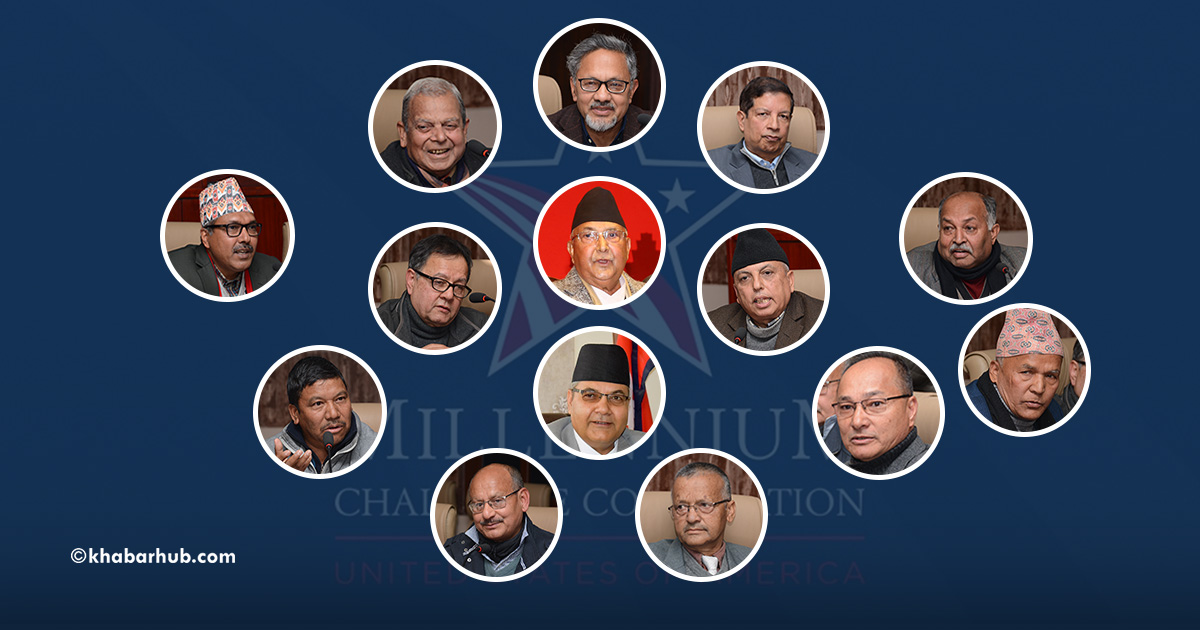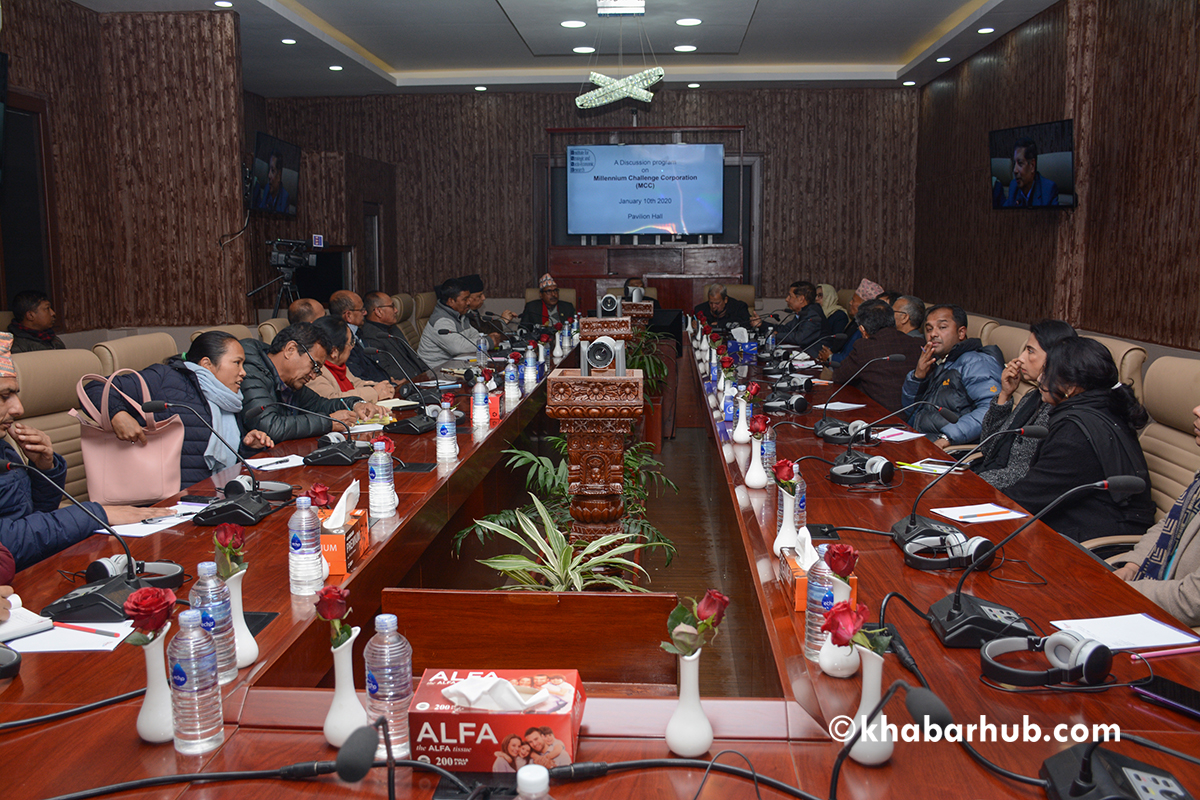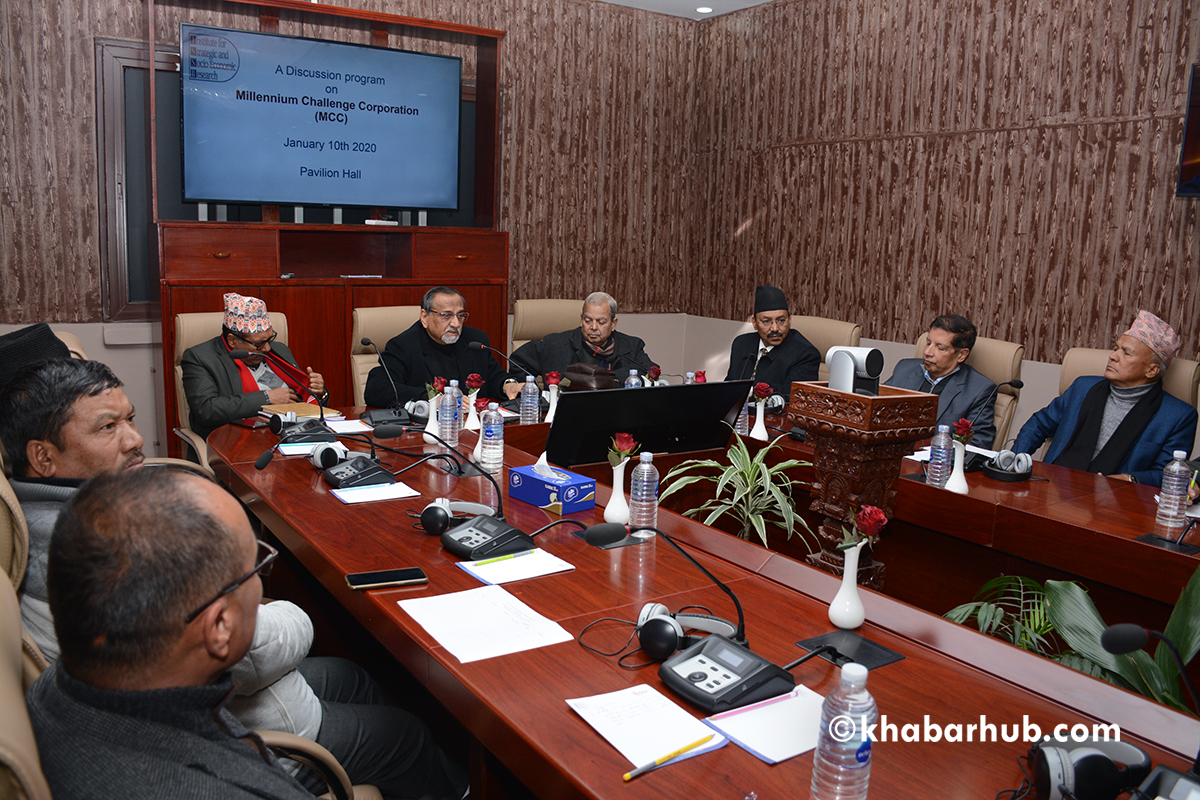0%

Ministers, lawmakers and experts say parliament should not delay in endorsing the MCC Compact. (Image/Khabarhub)
KATHMANDU: Amid wide postulations and misconceptions, the Millennium Challenge Corporation (MCC) is waiting for its presentation and ratification from the Parliament.
While a section of the society, especially those from the ruling Nepal Communist Party (NCP), have portrayed it as a ‘monster’, the main opposition party Nepali Congress, and a voluminous chunk of intellectuals fear that Nepal would lose a US $500 million MCC grant because of the ‘deliberate campaign’ of misinformation by some elements, and political differences among the ruling coalition.
Ministers, intellectuals, experts, former diplomats and a substantial chunk of politicians firmly believe that the grant is the largest one from a single source the country has ever received. Moreover, they say it presents a valuable opportunity to a country like Nepal to reduce poverty through economic growth shelving speculations and propaganda that MCC Compact has a military connection.
Minister for Communication and Information Technology, Gokul Prasad Baskota is confident about endorsing the MCC Nepal Compact from the parliament.
“The government will present it in the parliament,” Minister Baskota said in a confirmatory note saying that the project should not be crafted as mere political propaganda.
Baskota clarified that the Indo-Pacific Strategy does not have anything to do with the MCC project as rumored. “Rumors that MCC involves military are all baseless.”
Minister Baskota’s views come soon after Prime Minister KP Oli, at the NCP’s Central Committee meeting on Wednesday, made it clear that the MCC would be endorsed.
Meanwhile, in his address to the Parliament on Tuesday, PM Oli had categorically said that the MCC Nepal Compact has to be endorsed by the ongoing session of the parliament saying, “We do not have any time to waste.”
Baskota clarified that the Indo-Pacific Strategy does not have anything to do with the MCC project as rumored. “Rumors that MCC involves military are all baseless.”
Obviously, the second plenary CC meeting of the NCP, too, is expected to endorse the MCC project.
In tune with many other intellects and parliamentarians, Krishna Prasad Dahal, Chairperson, Finance Committee under the Federal Parliament, makes it a point to suggest that it is high time that Nepalis became realistic and showed maturity while dealing with issues related to the nation’s image in the international arena.

“We need to ensure that such grants would benefit the country and the people,” he said at a discussion program on MCC organized by the Institute for Strategic and Socio-Economic Research (ISSR) at the Pavilion Hall in Kathmandu earlier this month.
He, meanwhile, assured that his Committee would ‘cooperate affirmatively’ provided it comes to them. “Although the donors may have some interest in their donations,” he said, “Nepal needs to ensure its benefits from it.”
Dahal, however, suggested Nepal should not be provoked by anyone’s interest while expressing the hope that the MCC Compact will be ratified by the current session of the parliament.
The MCC Nepal Compact, too, has clarified that the Electricity Transmission Project and the Road Maintenance Project under it are priorities set by Nepal. It is a government agency under the Ministry of Finance.
Former Ambassador to the United States, Dr Shankar Sharma says there has been no mention of the Indo-Pacific Strategy in the MCC Compact that Nepal has signed.
“We have taken several types of aids from the USA,” Dr Sharma, who is also the former Vice Chairman of National Planning Commission, said while clarifying that there was nothing wrong accepting this.
He also went down the memory lane to recall Nepal’s approach for the MCC grant in 2002 while he was the ambassador to the US. Dr. Sharma claimed that Nepal had then failed to comply with the conditions mentioned as ‘various indicators’. “Had Nepal succeeded to entertain the grant then, it would certainly have changed the country’s fate,” he added.
Dr. Sharma clarifies that there was no relationship between MCC and the Indo Pacific Strategy as it had come into existence only in December 2017 which was even after Nepal signed the MCC.
Infrastructure policy expert and spokesperson of Sajha Party Nepal, Dr Surya Raj Acharya opines Nepal should not miss the MCC grant at any cost while dubbing it as ‘unfortunate’ to dispute on MCC.
He referred to the US cooperation in Nepal saying, “The USA, which is our development partner, has been supporting Nepal for years, more than 70 decades now.” Hastening to add further, Dr Acharya suggested a thorough consideration of the impacts of the conditions set in the Compact.

“Nepal’s national interest, development policy, and our work-plan should be the guiding documents on such issues.” Dr. Acharya suggested adding the needs to consider diplomatic initiation to ensure its successful implementation.
Senior leader of the Rastriya Janata Party-Nepal, Mahanta Thakur is optimistic that the ongoing session of the parliament makes a judicious decision on the issue to help end the current confusion surrounding the issue.
“I do not rule out the fact that donors have their interests. However, it is our responsibility to accept them in the country’s better interest,” Thakur said.
Former Ambassador to Denmark, Prof Vijay Kant Karna claims that the signing of the MCC by the Nepal government does not contradict the existing laws of Nepal.
For Hemant Malla, former DIG, Nepal Police, the speculations that the US is planning to use Nepal to counter China or India through the Compact is nothing more than an unsubstantiated and baseless allegation.
Karna labels it worthless to dispute on the issue as the government had agreed to ratify it from the parliament while signing the MCC Compact, which he argues is a good beginning.
The culture of being ‘double-standard’, he said, would damage the country’s reputation and even reduces the country’s credibility in the international arena.
Karna views that since both the transmission line and road maintenance fall under Nepal’s priorities, endorsing the MCC Compact without any apprehension would be a good choice.
The issue is, as he continued, the United States has never interfered in Nepal’s internal affairs since it established its bilateral relationship with Nepal in 1947. Moreover, since the US has rather supported Nepal in its democratic and human rights movements, accepting the $500 million dollar project does not require second-thought.
Chairperson of the ruling party NCP’s Foreign Affairs Department, Yadav Sharma, too, is convinced that Nepal would implement the MCC Compact at any cost. “Let’s not assume that the government or the party as a whole is against the Compact,” said Sharma hinting at the possibility of endorsing it from the Parliament soon.
For Hemant Malla, former DIG, Nepal Police, the speculations that the US is planning to use Nepal to counter China or India through the Compact is nothing more than an unsubstantiated and baseless allegation.
Countries, including the US, India or even China have supported Nepal in its capacity enhancement for years, argued Malla adding, “Moreover, the US has always been supportive to Nepal.”
Meanwhile, political analyst, Prof. Ganga Thapa, however, smells a rat in the project saying that the government has to be cautious about the donations or grants coming from power-nations.
Dr. Narendra Shrestha, former Secretary at the Ministry of Law, makes it a point to clarify that there was no mention of the military and military alliance in the MCC. “The most important part of it is economic cooperation,” he said.
Lawmaker of the ruling NCP, Gajendra Mahat, points out how MCC is being exaggerated or diverted in Nepal. “To assume that the USA will come to Nepal bypassing India is nothing more than chauvinism or radical nationalism,” he stated expressing the confidence of getting MCC Compact endorsed from the parliament.
Lawmaker Mahat, however, suggests taking India into confidence on the issue.
Meanwhile, KB Rokaya, former National Human Rights Commissioner, opines that lack of transparency on the part of the government has invited confusions, including the MCC.
Here’s what Narayan Adhikari, a counter-terrorism expert said, “I don’t understand why people are trying to make a mountain out of a molehill since no conditions mentioned in the Compact seem seeking Nepal as a member of the USA’s security alliance.”
Meanwhile, co-chair of ISSR Nepal, Prof Dr. Gobinda Nepal claims that the construction of the cross-border transmission line shall reward Nepal by making the power trade between Nepal and India and Nepal and third countries.